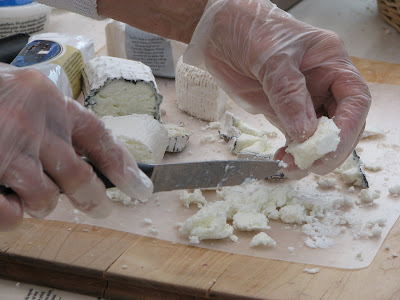 Fruits and Vegetables: While perusing the two lists that I linked to above you probably noticed that some fruits and vegetables appear on both. So, if you can't afford to buy all organic produce, why should you at least ensure that these particular items are? For two reasons. Some fruits and vegetables have thin permeable skins that allow pesticides, herbicides and chemical fertilizer residues to soak right in. No amount of washing will remove these chemicals, so if you buy conventional strawberries, peppers, celery or apples, just to name a few, be aware that you will be consuming the residue of up to 40 different fungicides, pesticides and herbicides. Yeah, I said 40. That brings us to number two. Some crops are hit with up to 500 lbs of chemicals per acre (think strawberries). And these aren't innocent chemicals either. Pesticides are meant to kill things, and some are very persistent carcinogens and mutagens. You want to reduce your exposure to these babies as much as possible.
Fruits and Vegetables: While perusing the two lists that I linked to above you probably noticed that some fruits and vegetables appear on both. So, if you can't afford to buy all organic produce, why should you at least ensure that these particular items are? For two reasons. Some fruits and vegetables have thin permeable skins that allow pesticides, herbicides and chemical fertilizer residues to soak right in. No amount of washing will remove these chemicals, so if you buy conventional strawberries, peppers, celery or apples, just to name a few, be aware that you will be consuming the residue of up to 40 different fungicides, pesticides and herbicides. Yeah, I said 40. That brings us to number two. Some crops are hit with up to 500 lbs of chemicals per acre (think strawberries). And these aren't innocent chemicals either. Pesticides are meant to kill things, and some are very persistent carcinogens and mutagens. You want to reduce your exposure to these babies as much as possible. Soy products and Canola: If you buy conventional soy products in the USA, you are pretty much guaranteed to be eating genetically modified (GMO) soy. Most conventional canola oil and other canola products are GMO as well. What's bad about genetically modified organisms? Well, some say nothing and others say a lot. Personally I don't like the effects of the GMOs as they have been observed so far. There is no labeling requirement for GMO products in the USA, so if you want to play it safe, buy organic. Certified organic products cannot be genetically modified.
You can read more about the issue here and here. Or just Google it. This is an ongoing controversy with a lot of people on either side, and if you don't know anything about it and want to learn more, the Internet is full of institutions, corporations and individuals arguing both for and against genetic modification (specifically manipulation, splicing and inserting of genes) of animals and plants. It is important to clarify that genetic modification as it is used here does not mean hybridization, or the natural crossing of different varieties of a plant or animal to yield a new variety. Genetically modified organisms are usually created by inserting genetic material from one plant or animal into the genetic structure of another. For example, Monsanto's infamous Roundup resistant soybeans. If you want to avoid supporting these creations, buy organic soy and canola much as possible.
Wheat products: Conventional wheat has some of the highest pesticide residue levels on the market today. For this reason the Consumers Union suggests that you buy organic wheat and wheat products whenever you can.
The Bottom Line: Of course it all comes down to money. And sadly food, health and economic class are closely intertwined not only abroad but right here in the USA. The bottom line is that sometimes one can't afford to buy organic. At the same time, what we eat is also about choices and priorities. Do we pay for cable TV or do we buy organic veggies instead of conventional ones? Should we splurge on consumer electronics or organic meat? Do we purchase an extra grande cappuccino on the way to work each day or do we use those extra bucks to make sure our fridges are stocked with organic milk instead of the conventional stuff? However, if it ever comes down to either buying organic strawberries or paying the rent, please just put that pint basket down and call it a day.
 As you can probably guess, I advocate buying locally, organically grown foods as much as possible. But like most people the world over, rising food prices have been hitting me hard. I greatly appreciate that I am not starving as a result of this inflation. I have a job and a roof over my head and I still shop at my local farmers' market. At the same time, as a full time graduate student living in an expensive city, I have had to change my eating habits, mainly by trying to eat out less, and searching for organic bargains (they do exist).
As you can probably guess, I advocate buying locally, organically grown foods as much as possible. But like most people the world over, rising food prices have been hitting me hard. I greatly appreciate that I am not starving as a result of this inflation. I have a job and a roof over my head and I still shop at my local farmers' market. At the same time, as a full time graduate student living in an expensive city, I have had to change my eating habits, mainly by trying to eat out less, and searching for organic bargains (they do exist).